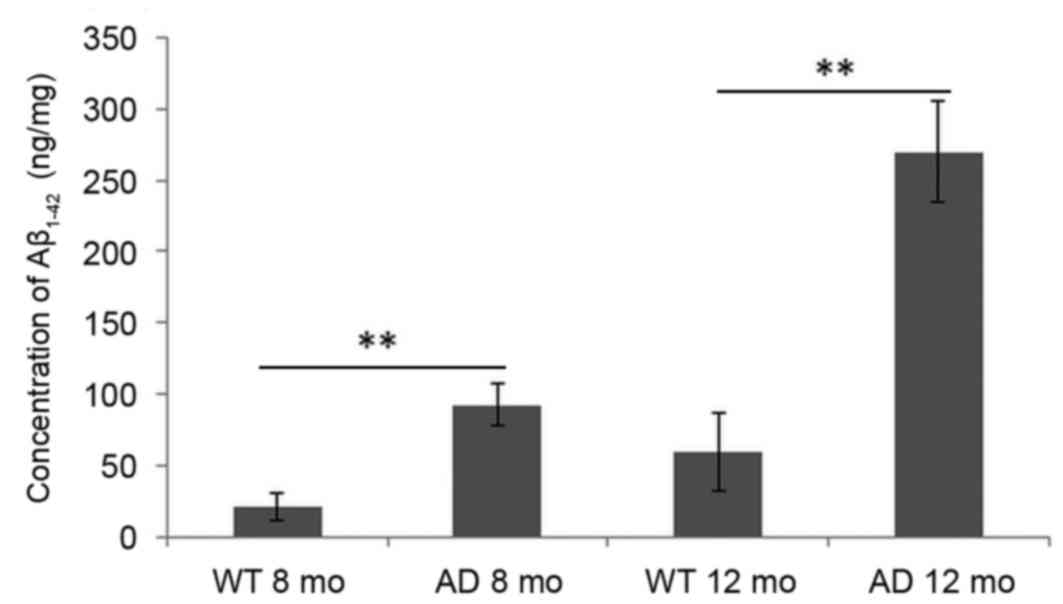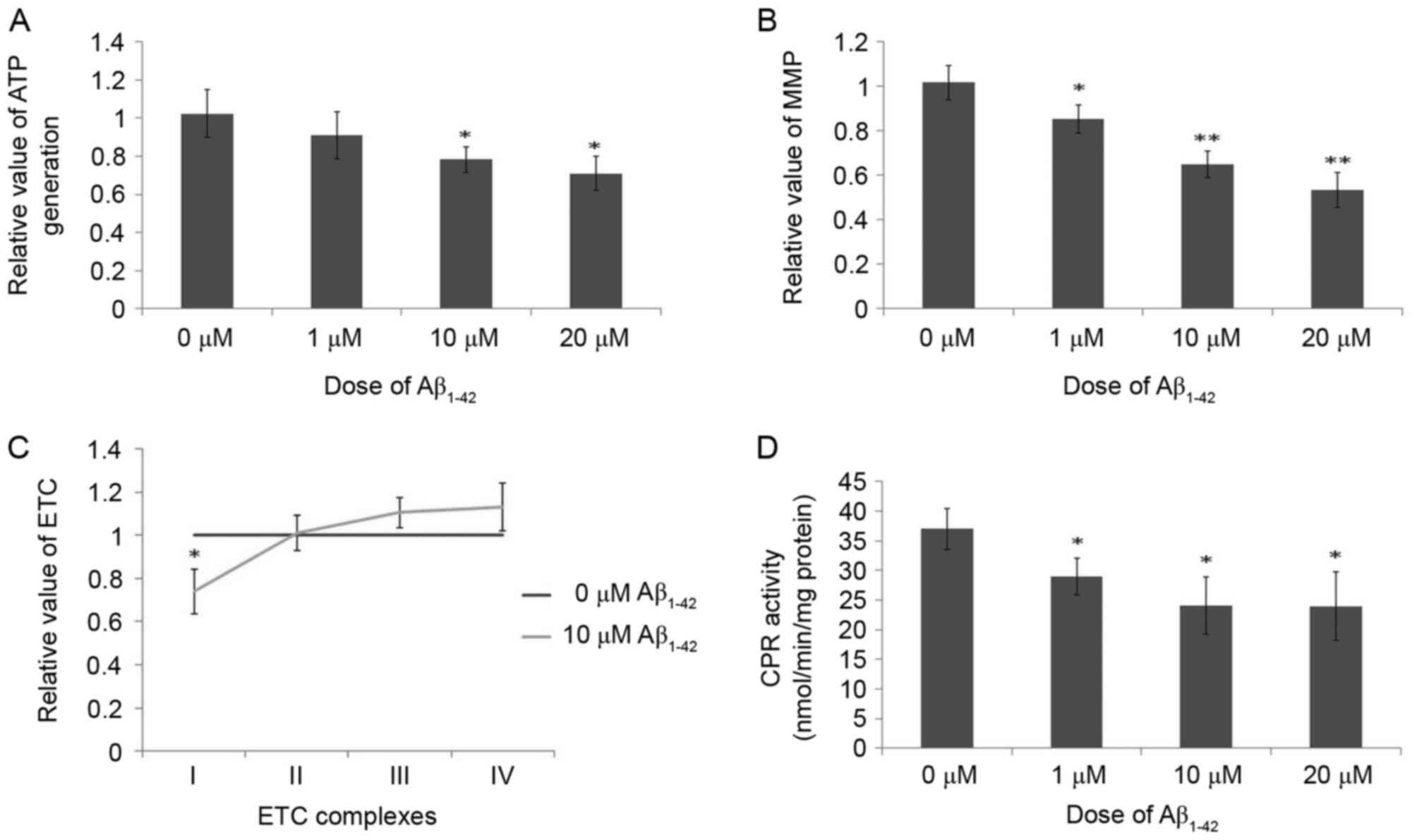|
1
|
Iqbal K and Grundke-Iqbal I: Developing
pharmacological therapies for Alzheimer disease. Cell Mol Life Sci.
64:2234–2244. 2007. View Article : Google Scholar : PubMed/NCBI
|
|
2
|
Awasthi M, Singh S, Pandey VP and Dwivedi
UN: Alzheimer's disease: An overview of amyloid beta dependent
pathogenesis and its therapeutic implications along with in silico
approaches emphasizing the role of natural products. J Neurol Sci.
361:256–271. 2016. View Article : Google Scholar : PubMed/NCBI
|
|
3
|
Clark IA and Vissel B: Amyloid β: One of
three danger-associated molecules that are secondary inducers of
the proinflammatory cytokines that mediate Alzheimer's disease. Br
J Pharmacol. 172:3714–3727. 2015. View Article : Google Scholar : PubMed/NCBI
|
|
4
|
Blennow K, Mattsson N, Schöll M, Hansson O
and Zetterberg H: Amyloid biomarkers in Alzheimer's disease. Trends
Pharmacol Sci. 36:297–309. 2015. View Article : Google Scholar : PubMed/NCBI
|
|
5
|
Wang ZX, Tan L, Liu J and Yu JT: The
essential role of soluble Aβ oligomers in Alzheimer's disease. Mol
Neurobiol. 53:1905–1924. 2016. View Article : Google Scholar : PubMed/NCBI
|
|
6
|
Thal DR, Walter J, Saido TC and Fändrich
M: Neuropathology and biochemistry of Aβ and its aggregates in
Alzheimer's disease. Acta Neuropathol. 129:167–182. 2015.
View Article : Google Scholar : PubMed/NCBI
|
|
7
|
Ebenezer PJ, Weidner AM, LeVine H III,
Markesbery WR, Murphy MP, Zhang L, Dasuri K, Fernandez-Kim SO,
Bruce-Keller AJ, Gavilán E and Keller JN: Neuron specific toxicity
of oligomeric amyloid-β: Role for JUN-kinase and oxidative stress.
J Alzheimers Dis. 22:839–848. 2010. View Article : Google Scholar : PubMed/NCBI
|
|
8
|
Bloom GS: Amyloid-β and tau: The trigger
and bullet in Alzheimer disease pathogenesis. JAMA Neurol.
71:505–508. 2014. View Article : Google Scholar : PubMed/NCBI
|
|
9
|
Drolle E, Hane F, Lee B and Leonenko Z:
Atomic force microscopy to study molecular mechanisms of amyloid
fibril formation and toxicity in Alzheimer's disease. Drug Metab
Rev. 46:207–223. 2014. View Article : Google Scholar : PubMed/NCBI
|
|
10
|
Rottkamp CA, Raina AK, Zhu X, Gaier E,
Bush AI, Atwood CS, Chevion M, Perry G and Smith MA: Redox-active
iron mediates amyloid-beta toxicity. Free Radic Biol Med.
30:447–450. 2001. View Article : Google Scholar : PubMed/NCBI
|
|
11
|
Liem RK and Messing A: Dysfunctions of
neuronal and glial intermediate filaments in disease. J Clin
Invest. 119:1814–1824. 2009. View
Article : Google Scholar : PubMed/NCBI
|
|
12
|
Tao YQ and Liang GB: Pathologic changes
and dysfunctions of astrocytes in the complex rat AD model of
ovariectomy combined with D-galactose injection. Bratisl Lek Listy.
115:692–698. 2014.PubMed/NCBI
|
|
13
|
Onyango IG, Dennis J and Khan SM:
Mitochondrial dysfunction in Alzheimer's disease and the rationale
for bioenergetics based therapies. Aging Dis. 7:201–214. 2016.
View Article : Google Scholar : PubMed/NCBI
|
|
14
|
Haddad D and Nakamura K: Understanding the
susceptibility of dopamine neurons to mitochondrial stressors in
Parkinson's disease. FEBS Lett. 589:3702–3713. 2005. View Article : Google Scholar
|
|
15
|
Rajasekaran A, Venkatasubramanian G, Berk
M and Debnath M: Mitochondrial dysfunction in schizophrenia:
pathways, mechanisms and implications. Neurosci Biobehav Rev.
48:10–21. 2015. View Article : Google Scholar : PubMed/NCBI
|
|
16
|
Zanger UM and Schwab M: Cytochrome P450
enzymes in drug metabolism: Regulation of gene expression, enzyme
activities, and impact of genetic variation. Pharmacol Ther.
138:103–141. 2013. View Article : Google Scholar : PubMed/NCBI
|
|
17
|
Laursen T, Jensen K and Møller BL:
Conformational changes of the NADPH-dependent cytochrome P450
reductase in the course of electron transfer to cytochromes P450.
Biochim Biophys Acta. 1814:132–138. 2011. View Article : Google Scholar : PubMed/NCBI
|
|
18
|
Coon MJ: Cytochrome P450: Nature's most
versatile biological catalyst. Annu Rev Pharmacol Toxicol. 45:1–25.
2005. View Article : Google Scholar : PubMed/NCBI
|
|
19
|
Li Y, Cheng D, Cheng R, Zhu X, Wan T, Liu
J and Zhang R: Mechanisms of U87 astrocytoma cell uptake and
trafficking of monomeric versus protofibril Alzheimer's disease
amyloid-β proteins. PLoS One. 9:e999392014. View Article : Google Scholar : PubMed/NCBI
|
|
20
|
Deb S, Zhang JW and Gottschall PE:
Activated isoforms of MMP-2 are induced in U87 human glioma cells
in response to beta-amyloid peptide. J Neurosci Res. 55:44–53.
1999. View Article : Google Scholar : PubMed/NCBI
|
|
21
|
Lai JC, Ananthakrishnan G, Jandhyam S,
Dukhande VV, Bhushan A, Gokhale M, Daniels CK and Leung SW:
Treatment of human astrocytoma U87 cells with silicon dioxide
nanoparticles lowers their survival and alters their expression of
mitochondrial and cell signaling proteins. Int J Nanomedicine.
5:715–723. 2010.PubMed/NCBI
|
|
22
|
Iyanagi T: Structure and function of
NADPH-cytochrome P450 reductase and nitric oxide synthase reductase
domain. Biochem Biophys Res Commun. 338:520–528. 2005. View Article : Google Scholar : PubMed/NCBI
|
|
23
|
O'Brien RJ and Wong PC: Amyloid precursor
protein processing and Alzheimer's disease. Annu Rev Neurosci.
34:185–204. 2011. View Article : Google Scholar : PubMed/NCBI
|
|
24
|
Hao J, Zhang W, Zhang P, Liu R, Liu L, Lei
G, Su C, Miao J and Li Z: Abeta20-29 peptide blocking apoE/Abeta
interaction reduces full-length Abeta42/40 fibril formation and
cytotoxicity in vitro. Neuropeptides. 44:305–313. 2010. View Article : Google Scholar : PubMed/NCBI
|
|
25
|
Jain P, Wadhwa PK and Jadhav HR: Reactive
astrogliosis: Role in Alzheimer's disease. CNS Neurol Disord Drug
Targets. 14:872–879. 2015. View Article : Google Scholar : PubMed/NCBI
|
|
26
|
Rodríguez JJ, Olabarria M, Chvatal A and
Verkhratsky A: Astroglia in dementia and Alzheimer's disease. Cell
Death Differ. 16:378–385. 2009. View Article : Google Scholar : PubMed/NCBI
|
|
27
|
Członkowska A and Kurkowska-Jastrzębska I:
Inflammation and gliosis in neurological diseases-clinical
implications. J Neuroimmunol. 231:78–85. 2011. View Article : Google Scholar : PubMed/NCBI
|
|
28
|
Agostinho P, Cunha RA and Oliveira C:
Neuroinflammation, oxidative stress and the pathogenesis of
Alzheimer's disease. Curr Pharm Des. 16:2766–2778. 2010. View Article : Google Scholar : PubMed/NCBI
|
|
29
|
Singh S and Joshi N: Astrocytes:
Inexplicable cells in neurodegeneration. Int J Neurosci.
127:204–209. 2017. View Article : Google Scholar : PubMed/NCBI
|
|
30
|
Robel S and Sontheimer H: Glia as drivers
of abnormal neuronal activity. Nat Neurosci. 19:28–33. 2016.
View Article : Google Scholar : PubMed/NCBI
|
|
31
|
Pekny M, Pekna M, Messing A, Steinhäuser
C, Lee JM, Parpura V, Hol EM, Sofroniew MV and Verkhratsky A:
Astrocytes: A central element in neurological diseases. Acta
Neuropathol. 131:323–345. 2016. View Article : Google Scholar : PubMed/NCBI
|
|
32
|
Yu D, Corbett B, Yan Y, Zhang GX, Reinhart
P, Cho SJ and Chin J: Early cerebrovascular inflammation in a
transgenic mouse model of Alzheimer's disease. Neurobiol Aging.
33:2942–2947. 2012. View Article : Google Scholar : PubMed/NCBI
|
|
33
|
Kvansakul M and Hinds MG: The Bcl-2
family: Structures, interactions and targets for drug discovery.
Apoptosis. 20:136–150. 2015. View Article : Google Scholar : PubMed/NCBI
|
|
34
|
Obulesu M and Lakshmi MJ: Apoptosis in
Alzheimer's disease: An understanding of the physiology, pathology
and therapeutic avenues. Neurochem Res. 39:2301–2312. 2014.
View Article : Google Scholar : PubMed/NCBI
|
|
35
|
Ajith TA and Padmajanair G: Mitochondrial
Pharmaceutics: A new therapeutic strategy to ameliorate oxidative
stress in Alzheimer's disease. Curr Aging Sci. 8:235–240. 2015.
View Article : Google Scholar : PubMed/NCBI
|
|
36
|
Jonckheere AI, Smeitink JA and Rodenburg
RJ: Mitochondrial ATP synthase: Architecture, function and
pathology. J Inherit Metab Dis. 35:211–225. 2012. View Article : Google Scholar : PubMed/NCBI
|
|
37
|
Estabrook RW: Steroid hydroxylations: A
paradigm for cytochrome P450 catalyzed mammalian monooxygenation
reactions. Biochem Biophys Res Commun. 338:290–298. 2005.
View Article : Google Scholar : PubMed/NCBI
|
|
38
|
Yao Y, Liu S, Wang Y, Yuan W, Ding X,
Cheng T, Shen Q and Gu J: Suppression of cytochrome P450 reductase
expression promotes astrocytosis in subventricular zone of adult
mice. Neurosci Lett. 548:84–89. 2013. View Article : Google Scholar : PubMed/NCBI
|
|
39
|
Norris PJ, Hardwick JP and Emson PC:
Localization of NADPH cytochrome P450 oxidoreductase in rat brain
by immunohistochemistry and in situ hybridization and a comparison
with the distribution of neuronal NADPH-diaphorase staining.
Neuroscience. 61:331–350. 1994. View Article : Google Scholar : PubMed/NCBI
|





















